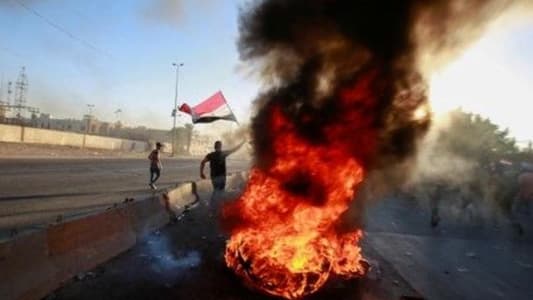Iraqi authorities lifted a days-long curfew in Baghdad on Saturday that anti-government protesters had defied, as the toll from four days of violent unrest rose to 72 killed and hundreds injured.
Traffic ran as normal through the Iraqi capital and streets and main squares were otherwise quiet. Concrete barriers blocked off areas where protesters in their thousands clashed with police during the week.
Officials from Prime Minister Adel Abdul Mahdi's office met protest leaders from Baghdad and other provinces to discuss their demands, state television reported. Abdul Mahdi and President Barham Salih said they would seek to meet the demands, state television also reported, but gave no details how exactly they would respond.
Authorities did not say why the curfew was lifted.
The country's parliament speaker proposed on Friday improving public housing for the poor and job opportunities for young people, as well as holding those who had killed protesters to account.
The unrest is the deadliest that Iraq has seen since the declared defeat of Islamic State in 2017 and has shaken Abdul Mahdi's year-old government. The government has responded with vague reform promises that are unlikely to placate Iraqis.
The semi-official High Commission for Human Rights said security forces had detained hundreds of people for demonstrating but then let most of them go. It said more than 3,000 people had been wounded in days of violence.
Police snipers shot at protesters on Friday, Reuters reporters said, escalating violent tactics used by the security forces that have included live fire, tear gas and water cannons.
The security forces have accused gunmen of hiding among demonstrators to shoot at police. Several policeman have died.
The protests over unfair distribution of jobs, lack of services and government corruption erupted on Tuesday in Baghdad and quickly spread to other Iraqi cities, mainly in the south.
A curfew in Dhi Qar province, where protesters were also killed this week, was ordered by local authorities starting from 1 p.m.
Powerful Iraqi cleric Moqtada al-Sadr, who has a mass popular following and controls a large chunk of parliament, demanded on Friday that the government resign and snap elections be held. At least one other major parliamentary grouping allied itself with Sadr against the government.
Parliament was set to meet on Saturday to discuss protesters' demands. Sadr's bloc has said it will boycott the session.






TWEET YOUR COMMENT